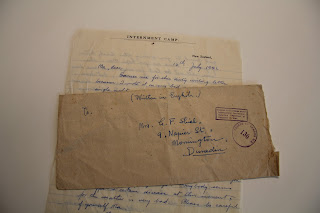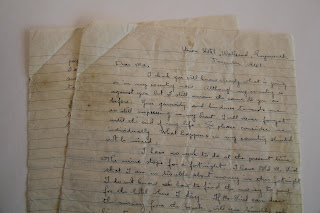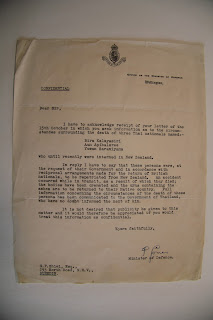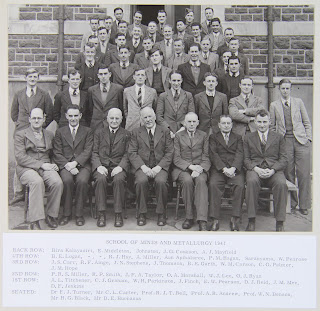‘I am going to be shifted from Somes Island in a few weeks. I don’t like to go away from the old place. I enjoy the sea and watching ships steaming pass [sic] the island. Although it is rather windy and unhealthy, its scenery soothes our weary hearts to some extent.’
(excerpt from a letter by Bira Kalayasiri to Mr Gerald Francis Shiel, dated 19 December 1942)
So wrote Bira Kalayasiri, a Thai national, to his New Zealand guardian Gerald Shiel from the Somes Island Internment Camp in Wellington Harbour. This letter is the final item of correspondence we have between the two. Within a year, Kalayasiri would be dead, one of the victims of an undisclosed accident that took place during his forced repatriation to Thailand in 1943.
 |
| Letter to the Shiels from the internment camp |
Kalayasiri and two of his compatriots, Aun Apibalsree and Yuwan Saraniyama, arrived in Dunedin to start study at the Otago School of Mines late in 1940. The trio appear to have received financial support from the Thai government and the firm Kampong Toh Tin Ltd. Patrick Shiel, the Singapore-based brother of Gerald, was connected with this company, and asked his Dunedin brother to take an interest in the students. A close association between Gerald, his wife Ina, and the Thai students developed; to the extent that the students suggested Gerald assume the role of their New Zealand guardian.
The folder of correspondence mostly holds letters written by Kalayasiri, Apibalsree and Saraniyama to Mr or Mrs Shiel (referred to by them as ‘Ma’) from their time spent carrying out work experience for their studies at the Wallsend Mine, near Greymouth, through to their internment at Somes Island. Although Kalayasiri tends to voice their experiences and predicament most vividly, all three initially express gratitude and affection to the Shiels for their goodness in Dunedin, and describe some of their working conditions and impressions of their workmates. As time progresses, the trio’s letters refer increasingly to the war underway and how they feel about it, and eventually move into expressions of frustration, conflicted emotion, and despair.
‘[…] although my country is against you but I still remain the same to you as before. Your generosity and kindness towards me are still impressing in my heart. I will never forget until the end of my life. So please consider me individually. What happens in my country should not be mixed.’
(excerpt from a letter to ‘Ma’ Shiel from Kalayasiri, December 1941)
‘Regarding my home in Thailand, I wonder whether I lost my father and mother or not. They stay in the fighting zone. I have lost my country. I do not know what will happen in future. I have lost my future. I have lost everything. Only thing I have now is only my poor humble soul waiting for the time when death calls upon me. I have to struggle for my life to see the future misery. I think what will happen in future will be worse than it is now. When I think of this I want to do something which will end my life.
I want to join the army here, but I do not expect to get it because I am an alien.’
(excerpts from a letter from Kalayasiri to Mr Shiel, December 1941)
 |
| Letter to ‘Ma’ in Dunedin from Greymouth |
Each of the group expresses a desire to join the New Zealand Army early on, and Saraniyama in particular made a concerted effort to enlist with the allied forces. All endeavours to sign up were futile, due to their status as enemy aliens. Their frustrations were amplified in their attempts to establish contact with groups that may have been able to provide them with advice or assistance, such as the recently established Free Thai Movement. Any ventures into overseas communication were thwarted by misinformation, lack of reply, and eventually censorship.
Few of the conditions of their internment are revealed, no doubt partially due to the censorship of letters written by those held in the camp. All three express boredom and frustration with their situation, but are able to continue with their studies, and financial support from the Thai government still reaches them, albeit with increasing delays. It is unclear exactly when in 1942 their internment commenced, or the point in 1943 that their fateful repatriation took place.
The Shiels, too, must have been aggravated with the situation the trio faced, and equally exasperated by the limited official information they eventually received after the youths lost their lives. A letter from the Minister of Defence to Mr Shiel states that ‘an accident occurred while in transit, as a result of which they died,’ and that ‘it is not desired that publicity be given to this matter and it would therefore be appreciated if you would treat this information as confidential.’ Compounding this tragedy, Gerald Shiel’s brother Patrick went missing, allegedly having met his death in an accident while fleeing Singapore in 1942; but the family had still not received any confirmation of his death by 1945.
 |
| Official notification of the trio’s deaths |
Information regarding the internment and death of the Thai trio sits in Ministry of Defence files held at Archives New Zealand. The files are restricted to preserve the personal privacy of those concerned, however, researcher may make application to the Chief Archivist for permission to view the files.
Kari Wilson-Allan
Assistant Archivist
Sources: AG-870/015 Correspondence relating to and with Bira Kalayasiri, Aun Apibalsree, and Yuwan Saraniyama and AG-870/016 Correspondence relating to the disappearance of Patrick Ormond Shiel, (Singapore 1945)
 |
| 1941 School of Mines photo, Bira, Aun and Yuwan are in the back rows |






Dear Anna
Any idea of the date of the gov. minister’s letter?
Hi Judy,
My guess is 1943 as that was the year that the students were killed in the plane crash at Whenuapai.
Kind regards
Anna